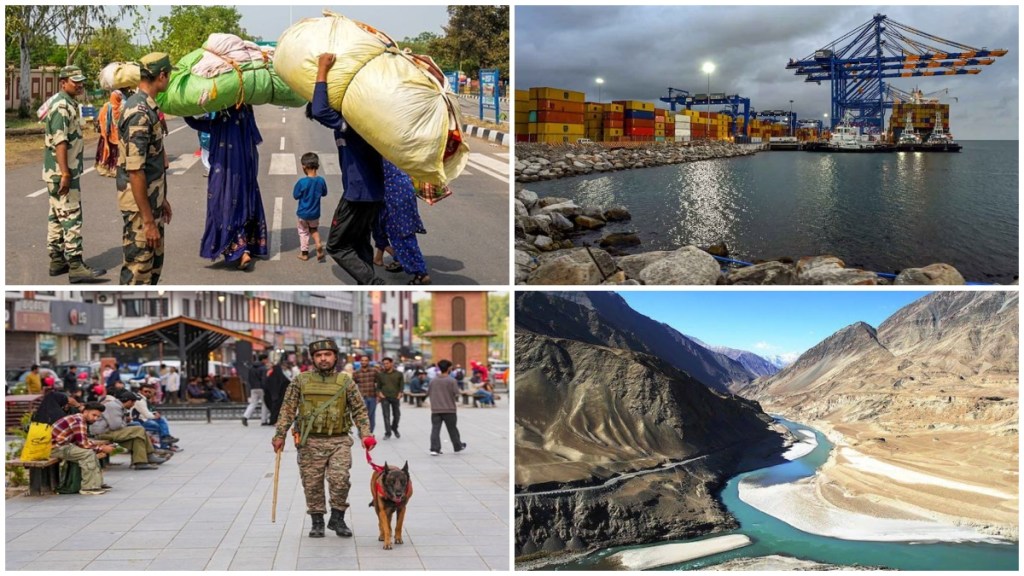Pahalgam Terror Attack: Following the Pahalgam terror attack on April 22 that claimed 26 lives, India has significantly escalated its diplomatic and strategic response to Pakistan. On May 3, New Delhi unveiled a second wave of punitive measures, intensifying pressure on Islamabad with a range of coordinated economic, diplomatic, and infrastructural actions.
In a sweeping second wave of retaliatory actions, the Indian government has announced a freeze on imports, halted all postal exchanges, banned docking of Pakistan-flagged ships, and restricted the flow of river water under the Indus Water Treaty framework.
Trade freeze and port ban
On May 3, India prohibited the “direct or indirect” import of all goods originating in or exported by Pakistan. The Directorate General of Foreign Trade (DGFT) issued an order citing “national security and public policy” as the basis for this action.
Simultaneously, the Ministry of Ports, Shipping and Waterways barred any Pakistani-flagged ship from docking at Indian ports and prohibited Indian ships from visiting Pakistani ports. “These decisions, taken in national interest, will come into force immediately,” the order stated, noting that exemptions may be issued on a case-by-case basis.
Postal links severed
India also suspended all categories of inbound mail and parcels from Pakistan. The Department of Posts, under the Ministry of Communications, issued a notification halting all air and surface mail exchanges. This marks a complete severance of formal communication routes between the two countries.
Indus Waters Treaty suspension
In a significant move affecting regional hydrology and bilateral agreements, India curtailed the flow of water to Pakistan from the Baglihar Dam on the Chenab River. Sluice spillways have been lowered to limit water reaching Pakistan’s Punjab as a “short-term punitive action,” according to a senior Indian official.
“The Chenab river water irrigates Punjab farmlands. Pakistan needs to realise we mean to punish them on all fronts,” the official told The Indian Express. Similar restrictions on the Kishanganga Dam on the Jhelum River may soon follow.
India shuts airspace
Following accusations of Pakistani involvement in the Pahalgam terror attack, Pakistan closed its airspace to Indian carriers on April 24. In a retaliatory move, India issued a Notice to Airmen (NOTAM) on April 30, barring all Pakistani-registered and operated aircraft — including commercial and military planes — from flying through Indian airspace. The restriction, effective until May 23.
Visa revocations and diplomatic curtailments
The latest measures follow a first wave of diplomatic reprisals: the downgrading of Pakistan’s diplomatic mission in New Delhi, closure of the Attari land border, and bans on certain Pakistani YouTube channels. Airspace access and bilateral trade—both direct and via third countries—have already been suspended.
India had already begun tightening its visa regime prior to these moves. As of April 27, fourteen categories of visas for Pakistani nationals—including tourist, business, film, and journalist visas—were revoked. Medical visas were cancelled on April 30, and SAARC visa exemptions rescinded by April 26. May 1 was set as the deadline for all Pakistani nationals with valid endorsements to exit India via Attari.
These efforts are part of a broader effort to scale down diplomatic presence, including reducing Pakistan’s High Commission staff, shutting the Attari border, and repatriating Pakistani defence officials.
Foreign Secretary Vikram Misri indicated that these actions are aimed at delivering a strong message after the Pahalgam attack, signaling that all levers—economic, diplomatic, and strategic—are on the table as India responds to what it views as Pakistan’s continued support for cross-border terrorism.


